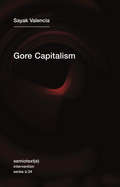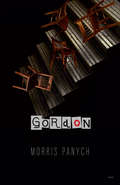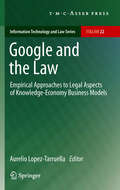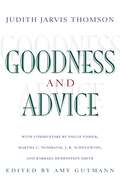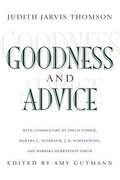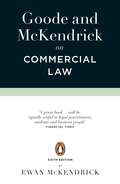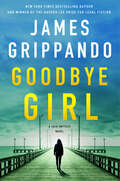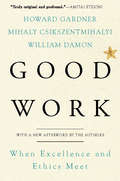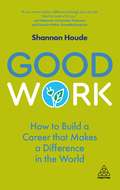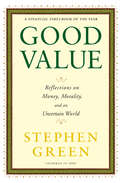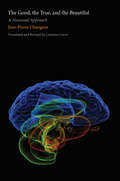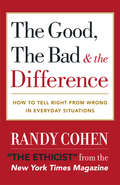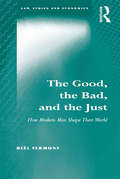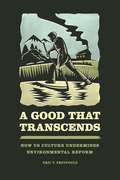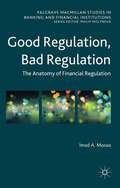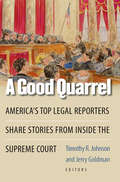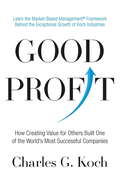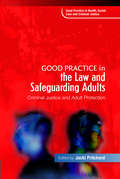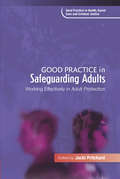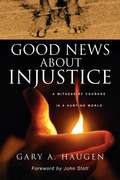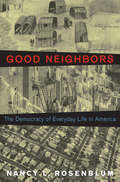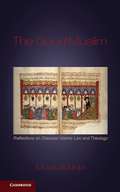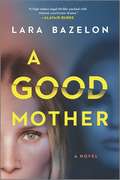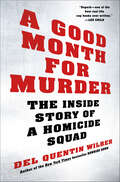- Table View
- List View
Gore Capitalism (Semiotext(e) / Intervention Series #24)
by Sayak ValenciaAn analysis of contemporary violence as the new commodity of today's hyper-consumerist stage of capitalism.“Death has become the most profitable business in existence.”—from Gore CapitalismWritten by the Tijuana activist intellectual Sayak Valencia, Gore Capitalism is a crucial essay that posits a decolonial, feminist philosophical approach to the outbreak of violence in Mexico and, more broadly, across the global regions of the Third World. Valencia argues that violence itself has become a product within hyper-consumerist neoliberal capitalism, and that tortured and mutilated bodies have become commodities to be traded and utilized for profit in an age of impunity and governmental austerity.In a lucid and transgressive voice, Valencia unravels the workings of the politics of death in the context of contemporary networks of hyper-consumption, the ups and downs of capital markets, drug trafficking, narcopower, and the impunity of the neoliberal state. She looks at the global rise of authoritarian governments, the erosion of civil society, the increasing violence against women, the deterioration of human rights, and the transformation of certain cities and regions into depopulated, ghostly settings for war. She offers a trenchant critique of masculinity and gender constructions in Mexico, linking their misogynist force to the booming trade in violence.This book is essential reading for anyone seeking to analyze the new landscapes of war. It provides novel categories that allow us to deconstruct what is happening, while proposing vital epistemological tools developed in the convulsive Third World border space of Tijuana.
Gordon
by Morris PanychUpon graduation from an educational institution that provides free room and board and is dedicated to freshman tutorials in applied criminology conducted by its post-graduate students, Gordon aims to build an innovative business with his former cellmate Carl. Then there's the question of pregnant, sullen Deirdre. By accident or design, this dysfunctional trio confronts "the end of the line."
Google for Lawyers: Essential Search Tips and Productivity Tools
by Carole A. Levitt Mark E. RoschLevitt, an attorney and former law librarian and Rosch, an attorney who runs a website for lawyers doing Internet research, detail how lawyers can use free and low-cost tools available through Google to compete with large firms and their large research and technology budgets. They explain how to use Google Scholar's case law database, Gmail, advertising, and the Google applications: Docs, News, Groups, Images, Blogs, Finance, Books, Chrome, Knol, Maps, Desktop Search, Calendar, Voice, Wave, Analytics, Translate, and other programs for basic and advanced research and office use. They include tips for searching case law and articles; locating information about the opposition, expert witnesses and jurors, and clients; and finding missing witnesses and heirs. Screen shots are included. Annotation ©2010 Book News, Inc. , Portland, OR (booknews. com)
Google and the Law
by Aurelio Lopez-TarruellaGoogle's has proved to be one of the most successful business models in today's knowledge economy. Its services and applications have become part of our day-to-day life. However, Google has repeatedly been accused of acting outside the law in the development of services such as Adwords, Googlebooks or YouTube. One of the main purposes of this book is to assess whether those accusations are well-founded. But more important than that, this book provides a deeper reflection: are current legal systems adapted to business models such as that of Google or are they conceived for an industrial economy? Do the various lawsuits involving Google show an evolution of the existing legal framework that might favour the flourishing of other knowledge-economy businesses? Or do they simply reflect that Google has gone too far? What lessons can other knowledge-based businesses learn from all the disputes in which Google has been or is involved? This book is valuable reading for legal practitioners and academics in the field of information technologies and intellectual property law, economists interested in knowledge-economy business models and sociologists interested in internet and social networks. Dr. Aurelio Lopez-Tarruella is Senior Lecturer in Private International Law at the University of Alicante, Spain.
Goodness and Advice (The University Center for Human Values Series #25)
by Judith Jarvis ThomsonHow should we live? What do we owe to other people? In Goodness and Advice, the eminent philosopher Judith Jarvis Thomson explores how we should go about answering such fundamental questions. In doing so, she makes major advances in moral philosophy, pointing to some deep problems for influential moral theories and describing the structure of a new and much more promising theory. Thomson begins by lamenting the prevalence of the idea that there is an unbridgeable gap between fact and value--that to say something is good, for example, is not to state a fact, but to do something more like expressing an attitude or feeling. She sets out to challenge this view, first by assessing the apparently powerful claims of Consequentialism. Thomson makes the striking argument that this familiar theory must ultimately fail because its basic requirement--that people should act to bring about the "most good"--is meaningless. It rests on an incoherent conception of goodness, and supplies, not mistaken advice, but no advice at all. Thomson then outlines the theory that she thinks we should opt for instead. This theory says that no acts are, simply, good: an act can at most be good in one or another way--as, for example, good for Smith or for Jones. What we ought to do is, most importantly, to avoid injustice; and whether an act is unjust is a function both of the rights of those affected, including the agent, and of how good or bad the act is for them. The book, which originated in the Tanner lectures that Thomson delivered at Princeton University's Center for Human Values in 1999, includes two chapters by Thomson ("Goodness" and "Advice"), provocative comments by four prominent scholars--Martha Nussbaum, Jerome Schneewind, Philip Fisher, and Barbara Herrnstein Smith--and replies by Thomson to those comments.
Goodness & Advice
by Judith Jarvis ThomsonHow should we live? What do we owe to other people? In Goodness and Advice, the eminent philosopher Judith Jarvis Thomson explores how we should go about answering such fundamental questions. In doing so, she makes major advances in moral philosophy, pointing to some deep problems for influential moral theories and describing the structure of a new and much more promising theory. Thomson begins by lamenting the prevalence of the idea that there is an unbridgeable gap between fact and value--that to say something is good, for example, is not to state a fact, but to do something more like expressing an attitude or feeling. She sets out to challenge this view, first by assessing the apparently powerful claims of Consequentialism. Thomson makes the striking argument that this familiar theory must ultimately fail because its basic requirement--that people should act to bring about the "most good"--is meaningless. It rests on an incoherent conception of goodness, and supplies, not mistaken advice, but no advice at all. Thomson then outlines the theory that she thinks we should opt for instead. This theory says that no acts are, simply, good: an act can at most be good in one or another way--as, for example, good for Smith or for Jones. What we ought to do is, most importantly, to avoid injustice; and whether an act is unjust is a function both of the rights of those affected, including the agent, and of how good or bad the act is for them. The book, which originated in the Tanner lectures that Thomson delivered at Princeton University's Center for Human Values in 1999, includes two chapters by Thomson ("Goodness" and "Advice"), provocative comments by four prominent scholars--Martha Nussbaum, Jerome Schneewind, Philip Fisher, and Barbara Herrnstein Smith--and replies by Thomson to those comments.
Goode and McKendrick on Commercial Law: 6th Edition
by Roy Goode Ewan McKendrickThe sixth edition of the authoritative and acclaimed commercial law text'A great book ... will be equally useful to legal practitioners, students and business people' Financial Times This sixth edition of Goode on Commercial Law, now retitled Goode and McKendrick on Commercial Law, remains the first port of call for the modern day practitioner with its theoretical and practical coverage of commercial law in both a national and an international context. Now updated to cover the most recent legal and technical changes, this highly acclaimed and authoritative text, which is regularly cited by all courts from the Supreme Court downwards, combines a deep theoretical analysis of foundational principles with a practical approach in the context of typical commercial and financial transactions. It is also replete with diagrams and specimen forms covering a wide range of transactions.'Searching analysis and meticulous exposition coupled with a lucid clarity of style and a relaxed lightness of touch combine to make the book not only compulsory but compulsive reading for anyone interested in its field' Law Quarterly Review'A work of immense scholarship ... Professor Goode's work must be as nearly exhaustive as can be possible and as produced by Penguin is a triumph of paperback publishing' Solicitor's Journal'Clear and comprehensive ... The student and practitioner will find it indispensable; the interested layperson too will benefit from it as a work of reference' British Business'A veritable tour de force' Business Law Review
Goodbye Girl: A Jack Swyteck Novel (Jack Swyteck Novel #18)
by James GrippandoA contentious intellectual piracy case leads to an unsolved murder, and Jack Swyteck’s client—a pop music icon—is the accused killer. Piracy costs the movie and music industry billions. No one has been able to stop it. But that won’t stop Miami criminal defense lawyer Jack Swyteck. His latest client, Imani Nichols, is a Grammy-winning popstar whose career has skyrocketed. Despite her success, she’s the most underpaid superstar on the planet because of an onerous record contract she signed as a teenager with her now ex-husband Shaky Nichols, who has made himself rich off her royalties. Preferring to see thieves profit from her music than let her ex-husband pocket one more dime, Imani takes to social media and tells her millions of fans to “go pirate” and download her music illegally. Her hardball tactic leads to scorched-earth litigation, and now she needs Jack’s help. The case takes a deadly turn when salacious allegations of infidelity send Imani and Shaky down a path of mutual assured destruction, each implicating the other in the unsolved murder of Imani’s extra-marital lover twelve years ago. Tyler McCormick died of asphyxiation, and his body was found in Biscayne Bay, chained to a piling with the words "goodbye girl" impressed on his chest. Despite their fierce denials, Imani and Shakey are both indicted for murder, leading to a sensational trial that exposes shocking secrets about their failed marriage, their cut-throat business partnership, and Imani’s astonishing success. Yet as Jack discovers, uncovering the truth about the killing and the cryptic “goodbye girl” won’t just exonerate or convict his client, her ex, and their music empire. It may shape the future of the entire recording industry.
Good Work: When Excellence and Ethics Meet
by Howard GardnerWhat does it mean to carry out "good work"? What strategies allow people to maintain moral and ethical standards at a time when market forces wield unprecedented power and work life is being radically altered by technological innovation? These are the questions at the heart of this important collaboration by three leaders in psychology. Enlivened with stories of real people facing hard decisions, Good Work offers powerful insight into one of the most important issues of our time and, indeed, into the future course of science, technology, and communication.
Good Work: How to Build a Career that Makes a Difference in the World
by Shannon HoudeDo you want to have a positive impact on the world? Do you want to have a successful career that makes a difference? In short... do you want to do Good Work? Let this step-by-step guide show you how. Packed with useful tools and exercises, this step-by-step guide will help you figure out your passion and purpose, and how to effectively harness it to make real and positive change - on the world, and on your career. Whether you want to battle climate change, promote diversity and inclusion, work in sustainability - or if you're not sure, but just want to leave things a little better at the end of every work day - let this book support you in turning that passion into action. Written by corporate responsibility consultant and certified coach Shannon Houde, this book is part career guide and part job search help - and all purpose-driven. From understanding what the 'purpose economy' is and how you fit into it, to what jobs to go for and how to land them, Good Work is the helping hand you need to make a career out of changing the world.
Good Value: Reflections on Money, Morality and an Uncertain World
by Stephen GreenCan one be both an ethical person and an effective businessperson? Stephen Green, an ordained priest and the chairman of HSBC, thinks so. In Good Value, Green retraces the history of the global economy and its financial systems, and shows that while the marketplace has delivered huge advantages to humanity, it has also abandoned over a billion people to extreme poverty, encouraged overconsumption and debt, and ravaged the environment.How do we reconcile the demands of capitalism with both the common good and our own spiritual and psychological needs as individuals? To answer that, and some of the most vexing questions of our age, Green takes us on a lively and erudite journey through history, looking for lessons in the work of economists and philosophers, businessmen and poets, theologians and novelists, playwrights and political scientists. An essential business book by a man who is uniquely qualified to write it, Good Value is a timely and persuasive analysis of the most pressing financial and moral questions we face.
The Good, the True, and the Beautiful
by Jean-Pierre ChangeuxIn this fascinating and bold discussion, a renowned neurobiologist serves as guide to the most complex physical object in the living world: the human brain. Taking into account the newest brain research—morphological, physiological, chemical, genetic—and placing these findings in the context of psychology, philosophy, art, and literature, Changeux ventures into the unexplored territories where these diverse disciplines intersect. Changeux's book draws on Plato's notion that the Good, the True, and the Beautiful are celestial essences or ideas, independent but so intertwined as to be inseparable. Placing these essences within the characteristic features of the human brain's neuronal organization, the author addresses unsolved questions in neuroscience today. With imagination and deep insight, Changeux illuminates the evolution of the brain and deciphers what new developments in neuroscience may portend for the future of humanity.
The Good, the Bad & the Difference
by Randy CohenThe man behind the New York Times Magazine's immensely popular column "The Ethicist"-syndicated in newspapers across the United States and Canada as "Everyday Ethics"-casts an eye on today's manners and mores with a provocative, thematic collection of advice on how to be good in the real world.Every week in his column on ethics, Randy Cohen takes on conundrums presented in letters from perplexed people who want to do the right thing (or hope to get away with doing the wrong thing), and responds with a skillful blend of moral authority and humor. Cohen's wisdom and witticisms have now been collected in The Good, the Bad & the Difference, a collection of his columns as wise and funny as a combination of "Dear Abby," Plato, and Mel Brooks. The columns are supplemented with second thoughts on (and sometimes complete reversals of) his original replies, follow-up notes on how his advice affected the actions of various letter writers, reactions from readers both pro and con, and observations from such "guest ethicists" as David Eggers and the author's mom. Each chapter also features an "Ethics Pop Quiz," and readers will be invited to post their answers on the book's Web site. The best of them will appear in a future paperback edition of the book.The Good, the Bad & the Difference is divided into seven sections: *Civic Life (what we do in public) *Family Life (what we do at home) *Social Life (what we do in other people's homes) *Commercial Life (what we do in situations where money is a factor) *Medical Life (the rights and obligations of patients and caregivers) *Work Life (ethics for the professional sphere) *School Life (moral questions from and about kids)Each section provides a window into how we live today, shedding light on the ways in which a more ethical approach to the decisions we make, and to our daily behavior, can make a big difference in how we feel about ourselves tomorrow.From the Hardcover edition.
The Good, the Bad, and the Just: How Modern Men Shape Their World (Law, Ethics and Economics)
by Riël VermuntDrawing on multidisciplinary findings and ideas, this book discusses fair allocation of social resources, such as goods, services and information, in a novel and integrated way. The role of the essential features of allocation behavior: motivation, cognition and emotion, as well as morality and reactions to perceived unfairness are examined in the newly developed Justice Model. The author offers explanations as to why, how and to what extent, people, in an effort to attain justice, allocate social resources between self and others and among others. It is held that the allocation event, featuring actor, recipient and observer, as well as the resources to be allocated by an actor, can function as a guideline for the essentials of fair behavior. The work explores the conditions under which an actor may deviate from a just division of social resources thus instigating a reaction from recipients and observers. The study covers various levels of analysis ranging from the intra-personal to the societal. The book will be of interest to academics and researchers working in the areas of crime, law, justice, public policy and governance.
A Good That Transcends: How US Culture Undermines Environmental Reform
by Eric T. FreyfogleSince the birth of the modern environmental movement in the 1970s, the United States has witnessed dramatic shifts in social equality, ecological viewpoints, and environmental policy. With these changes has also come an increased popular resistance to environmental reform, but, as Eric T. Freyfogle reveals in this book, that resistance has far deeper roots. Calling upon key environmental voices from the past and present—including Aldo Leopold, Wendell Berry, David Orr, and even Pope Francis in his Encyclical—and exploring core concepts like wilderness and the tragedy of the commons, A Good That Transcends not only unearths the causes of our embedded culture of resistance, but also offers a path forward to true, lasting environmental initiatives. A lawyer by training, with expertise in property rights, Freyfogle uses his legal knowledge to demonstrate that bad land use practices are rooted in the way in which we see the natural world, value it, and understand our place within it. While social and economic factors are important components of our current predicament, it is our culture, he shows, that is driving the reform crisis—and in the face of accelerating environmental change, a change in culture is vital. Drawing upon a diverse array of disciplines from history and philosophy to the life sciences, economics, and literature, Freyfogle seeks better ways for humans to live in nature, helping us to rethink our relationship with the land and craft a new conservation ethic. By confronting our ongoing resistance to reform as well as pointing the way toward a common good, A Good That Transcends enables us to see how we might rise above institutional and cultural challenges, look at environmental problems, appreciate their severity, and both support and participate in reform.
Good Regulation, Bad Regulation
by Imad A. MoosaSince the 2007 2008 global financial crisis, there has been much debate about the role of financial regulation and the causes of financial instability in the industry. Where studies commonly question the value of a regulated rather than free market , this book focuses on the differentiation of 'good regulation' and 'bad regulation'. This book highlights the need for financial regulation to combat corruption, and the integral link that exists between corruption and financial instability. The author evaluates the benefits and shortcomings of specific types of regulation, drawing on recent examples to illustrate each argument. The book presents compelling arguments for the regulation of leverage, liquidity, payday loans and securitisation; and debates the negative aspects of the regulation of short selling, and high-frequency trading, and of Basel-style banking regulation. The author argues that there is no free-market solution to financial instability, and rejects the idea of 'too big to fail'.
A Good Quarrel: America's Top Legal Reporters Share Stories from Inside the Supreme Court
by Timothy R. Johnson Jerry GoldmanWhile reading what top legal reporters say about some of the most important U. S. Supreme Court oral arguments in recent history, go to www. goodquarrel. com to listen to audio and hear for yourself the very style and delivery of the oral arguments that have shaped the history of our nation's highest law. See Preface for full instructions. Contributors Charles Bierbauer, CNN Lyle Denniston, scotusblog. com Fred Graham, Court TV Brent Kendall,Los Angeles Daily Journal Steve Lash,Houston Chronicle Dahlia Lithwick, Slate. com Tony Mauro, American Lawyer Media Tim O'Brien, ABC News David Savage,Los Angeles Times Greg Stohr, Bloomberg News Nina Totenberg, NPRTimothy R. Johnson teaches in the Department of Political Science and the Law School at the University of Minnesota. Jerry Goldman teaches political science at Northwestern University and directs the OYEZ Project, a multimedia archive devoted to the Supreme Court, at www. oyez. org . Cover sketch by Dana Verkouteren"Supreme Court oral arguments are good government in action. A Good Quarrelbrilliantly showcases this important aspect of the Court's work. " ---Paul Clement, Partner, King & Spalding, and former United States Solicitor General"Few legal experiences are as exhilarating as a Supreme Court oral argument---a unique art form that this superb collection brings vividly to life. " ---Kathleen Sullivan, Partner, Quinn Emanuel Urquhart Oliver and Hedges, and former Dean, Stanford Law School"[A Good Quarrel] shines a brilliant spotlight on the pivotal moment of advocacy when the Supreme Court confronts the nation's most profound legal questions. " ---Thomas C. Goldstein, Partner, Akin Gump, and Lecturer, Supreme Court Litigation, Harvard Law School and Stanford Law School"A brilliant way to understand America's most important mysterious institution. " ---Lawrence Lessig, Stanford Law School
Good Profit: How Creating Value for Others Built One of the World's Most Successful Companies
by Charles G. KochA NEW YORK TIMES BESTSELLERIn 1961, Charles Koch joined his father's Wichita-based company, then valued at $21 million. Six years later, following his father's death, he was named chairman of the board and CEO of Koch Industries, Inc. Today, Koch Industries' estimated worth is $100 billion - making it one of the largest private companies in the world. Koch exceeds the S&P 500's five-decade growth by 27-fold, and plans to double its value on average every six years. What exactly does this company do and why is it so remarkably profitable? While you won't find the Koch name on your stain-resistant carpet, stretch denim jeans, the connectors in your smartphone or your baby's ultra-absorbent diapers, Charles Koch's Market-Based Management® system, intended to generate good profit, drove these innovations and many more. Good profit results from products and services that customers vote for freely with their money; products that help improve people's lives. It results from a culture where employees are empowered to act entrepreneurially to discover customer preferences and the best ways to satisfy them. Good profit is the earnings that follow when long-term value is created for everyone - customers, employees, shareholders and society. Readers will learn to:· Craft a vision for how a business can thrive in spite of disruption and ever-changing consumer values· Find and retain a workforce possessing both virtue and talent (the first being the more important)· Award employees with ownership and decision rights based on their comparative advantages and proven contributions, rather than job title· Motivate all employees to maximise their contributions with effectively structured incentives so employees' compensation is limited only by the value they create - not budgets or company-wide policy A must-read for any leader, entrepreneur or student, as well as those who want a more civil, fair and prosperous society, GOOD PROFIT is destined to rank as one of the greatest management books of all time.
Good Practice in the Law and Safeguarding Adults: Criminal Justice and Adult Protection
by David Hewitt Penny Letts Steve Kirkpatrick Kathryn Mackay Mark Pathak Alan Noel Carter Simon Leslie Peter Sadler Geraldine Monaghan Glyn Hughes Rob Harris Teresa Gorczynska Marilyn Mornington Kathryn Stone Jacki Pritchard Adrian HughesGood Practice in the Law and Safeguarding Adults provides an up-to-date summary of developments in the legislative framework and best practice relevant to the area of adult protection work. It explains legislation that can be used in adult protection work, covering criminal and civil law, and crucial national guidance such as Achieving Best Evidence. Issues covered include confidentiality and information-sharing in adult protection work, capacity issues, police investigations, financial abuse, advocacy, witness support and honour-based violence. The book is illustrated throughout with case studies and good practice points. This book will be essential reading for anyone working with vulnerable adults, including health and social care workers, care managers, support workers, volunteers, advocates, police, probation staff, prison staff, lawyers training officers and students.
Good Practice in Safeguarding Adults: Working Effectively in Adult Protection
by Ghizala Avan Alison Bowes Gary Fitzgerald Deborah Kitson Jamieson Mornington Arwel Owen Jackie Parker Simon Leslie Peter Sadler Seena Fazel Sherry Bien Macintosh Marilyn Mornington Lucy Naven Jacki Pritchard Adrian Hughes Adrian HayesGood Practice in Safeguarding Adults provides an up to date and topical overview of developments in policy, guidance, legislation and practice in the area of adult protection. The book aims to broaden thinking about adult abuse, assesses alternative models of practice such as criminal justice and welfare, and covers groups who may be overlooked, such as people with brain injuries, older prisoners and adults within the black and minority ethnic communities. Issues covered include domestic violence and honour-based crime, abuse in institutions, financial abuse, and risk assessment in adult protection. The book is illustrated throughout with case studies, and also gives a voice to the victims of adult abuse who can be forgotten in a working environment that emphasises target performance, indicators, standards, star ratings, paperwork and correct use of terminology. This book will be essential reading for anyone working with vulnerable adults, including social workers, care managers, care workers, health care staff, police, probation officers, staff within the prison system, advocates, volunteers, training officers and students.
Good News About Injustice: A Witness of Courage in a Hurting World
by Gary A. HaugenGary Haugen says "the good news about injustice is that God is against it!" Offering his own and others' stories alongside proven, practical strategies, he shows how you too can stand against injustice wherever it occurs.
Good Neighbors: The Democracy of Everyday Life in America
by Nancy L. Rosenblum"Love thy neighbor" is an impossible exhortation. Good neighbors greet us on the street and do small favors, but neighbors also startle us with sounds at night and unleash their demons on us, they monitor and reproach us, and betray us to authorities. The moral principles prescribed for friendship, civil society, and democratic public life apply imperfectly to life around home, where we interact day to day without the formal institutions, rules of conduct, and means of enforcement that guide us in other settings. In Good Neighbors, Nancy Rosenblum explores how encounters among neighbors create a democracy of everyday life, which has been with us since the beginning of American history and is expressed in settler, immigrant, and suburban narratives and in novels, poetry, and popular culture. During disasters, like Hurricane Katrina, the democracy of everyday life is a resource for neighbors who improvise rescue and care. Degraded, this framework can give way to betrayal by neighbors, as faced by the Japanese Americans interned during World War II, or to terrible violence such as the lynching of African Americans. Under extreme conditions the barest act of neighborliness is a bulwark against total ethical breakdown. The elements of the democracy of everyday life--reciprocity, speaking out, and "live and let live"--comprise a democratic ideal not reducible to public principles of justice or civic virtue, but it is no less important. The democracy of everyday life, Rosenblum argues, is the deep substrate of democracy in America and can be its saving remnant.
The Good Muslim
by Mona SiddiquiIn this unusual, thought-provoking and beautifully written book, Mona Siddiqui reflects upon key themes in Islamic law or theology. She has selected these topics, which range through discussions about friendship, divorce, drunkenness, love, slavery, and ritual slaughter, in part because they are of particular interest to her, and in part because they reveal fascinating insights into Islamic ethics, and the way in which arguments developed in medieval juristic discourse. These pre-modern religious works contained a richness of thought, hesitation and speculation on a wide range of topics, which were socially relevant but also presented intellectual challenges to the scholars for whom God's revelation could be understood in diverse ways. These subjects of course remain very relevant today, both for practicing Muslims and for scholars of Islamic law and religious studies, and the book shows just how these debates resonate in contemporary Islamic thought. Mona Siddiqui is an astute and articulate interpreter who relays complex ideas about the Islamic tradition with great clarity. These are important attributes for a book which, as the author acknowledges, charts her own journey through the classical texts, and reflects upon how the principles expounded there have guided her own thinking and impacted on her teaching and research.
A Good Mother: A Novel
by Lara BazelonA Library Journal Best Debut Novel of Spring and Summer 2021"A high-stakes legal thriller packed with intense courtroom drama." -Alafair BurkeA gripping debut thriller about two young mothers, one shocking murder and a court case that puts them both on trial.When a soldier is found stabbed through the heart at a US Army base, there is no doubt that his wife, Luz, is to blame. But was it an act of self-defense? An attempt to save her infant daughter? Or the cold-blooded murder of an innocent man?Ambitious public defender Abby is determined to win at all costs. As a new mother herself, she wants to keep Luz out of prison and with her daughter. But when the surprises stack up and shocking new evidence emerges, Abby realizes the task proves far more difficult than she suspected and will require a terrible sacrifice.As the trial hurtles toward an outcome no one expects, Abby, Luz and a captivated jury are forced to answer the question that will decide everything—what does it mean to be a good mother?&“Lara Bazelon combines a riveting courtroom thriller with a nuanced and thought-provoking examination of gender, race, and justice. Helmed by an intelligent, complex, and flawed protagonist, A Good Mother is a beautifully written debut that kept me turning the pages late into the night.&” —Angie Kim, author of Miracle Creek"Sexy, shrewd, and wholly contemporary, A Good Mother takes pitch-perfect characters, a page-whipping plot, and themes about marriage, lust, betrayal, and the juggling of new motherhood plus a hard-driving career and mixes it all into a deeply perceptive legal thriller that made me drop everything else and just READ." —Cathi Hanauer, New York Times bestselling author of Gone, The Bitch in the House and The Bitch Is Back
A Good Month for Murder: The Inside Story of a Homicide Squad
by Del Quentin WilberBestselling author Del Quentin Wilber tells the inside story of how a homicide squad---a dedicated, colorful team of detectives—does its almost impossible jobTwelve homicides, three police-involved shootings and the furious hunt for an especially brutal killer--February 2013 was a good month for murder in suburban Washington, D.C.After gaining unparalleled access to the homicide unit in Prince George's County, which borders the nation's capital, Del Quentin Wilber begins shadowing the talented, often quirky detectives who get the call when a body falls. After a quiet couple of months, all hell breaks loose: suddenly every detective in the squad is scrambling to solve one shooting and stabbing after another. Meanwhile, the entire unit is obsessed with a stone-cold "red ball," a high-profile case involving a seventeen-year-old honor student attacked by a gunman who kicked down the door to her house and shot her in her bed.Murder is the police investigator's ultimate crucible: to solve a killing, a detective must speak for the dead. More than any recent book, A Good Month for Murder shows what it takes to succeed when the stakes couldn't possibly be higher.
